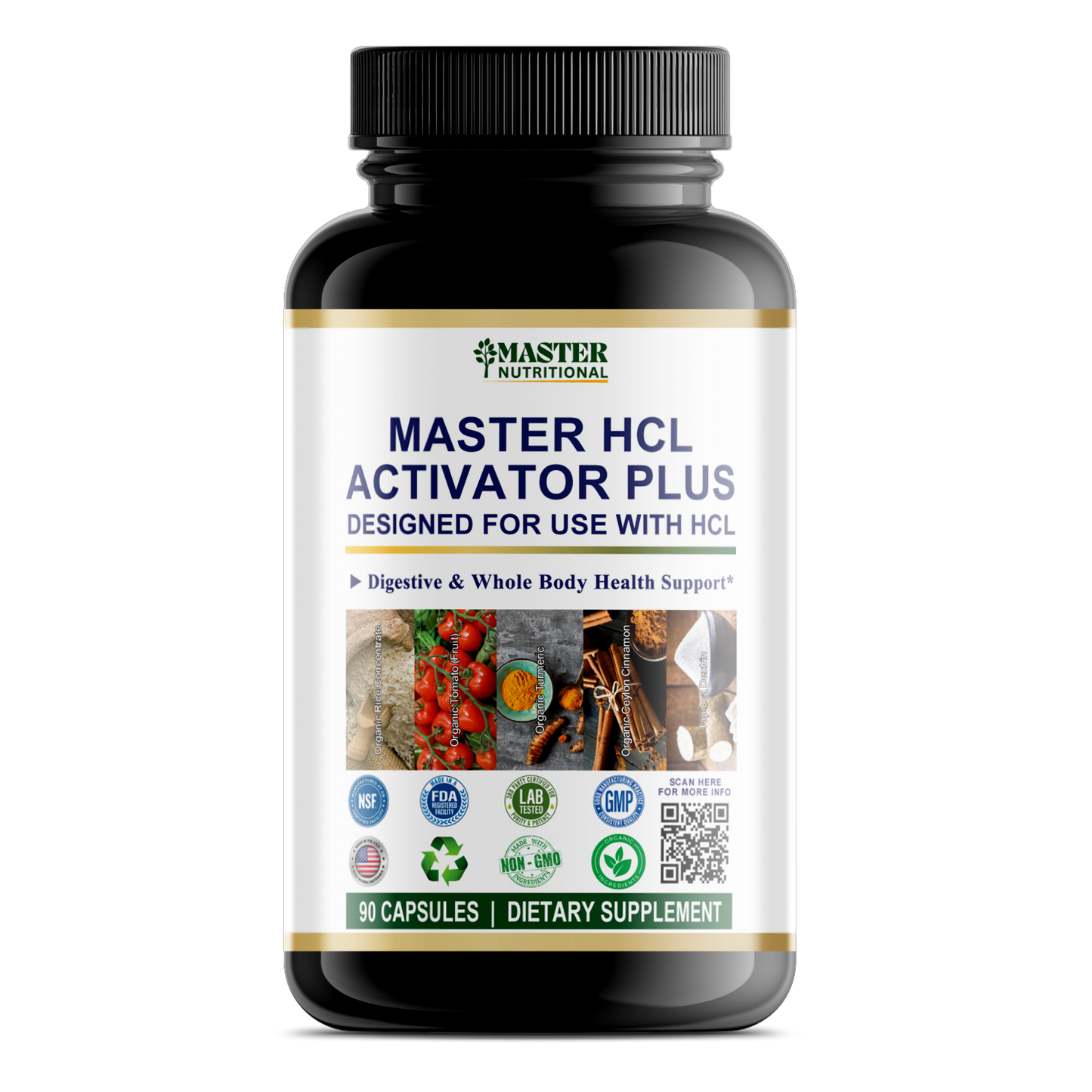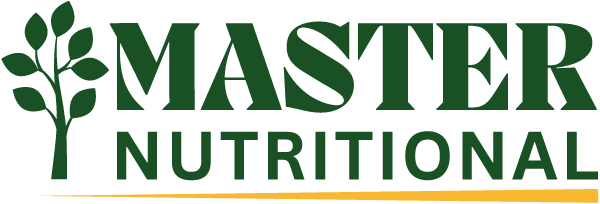Medical Grade Supplement Line
Master HCL Activator Plus: Transform Health and Experience Gut Relief
Master HCL Activator Plus: Transform Health and Experience Gut Relief
Enjoy 5% Discount Code: MDAY24, valid till August 31, 2025
Couldn't load pickup availability
Unlock the secret to optimal digestion with Master HCL Activator Plus by Master Nutritional. It is a revolutionary formula meticulously crafted through cutting-edge scientific research and expert formulation.
Specially designed to address the challenges of aging adults, this supplement supports the digestion of essential nutrients, maintains optimal stomach pH, and ensures balanced stomach acid levels.
Master Nutritional also developed Master Betaine HCL Plus for a Superior Digestive Experience! You can use it, and feel free to notice the changes!
Proper Use of Master HCL Activator Plus
Take a single Master HCL Activator Plus capsule three times daily.

Key Features
✓ Made in the USA.
✓ Subjected to rigorous third-party testing
✓ Gluten-Free.
✓ All-Natural.
✓ Non-GMO.
✓ Lactose-Free.
✓ Zero Added Sugar.
✓ Vegan-Friendly.
✓ Organic Ingredients.
✓ Corn-Free.
✓ Manufactured at an NSF Certified Facility (NSF/ANSI 455).
Formula Ingredients of Master HCL Activator Plus
→ Betaine HCL.
→ Organic Turmeric.
→ Organic Tomato.
Discover the Benefits of Master HCL Activator Plus Gut Formula
Master HCL Activator Plus is your ally in promoting optimal digestion and overall well-being. Here's why it stands out:
☛ It is Scientifically Formulated.
☛ Synergistic Support.
☛ Powerful Enzyme Combination.
☛ Enhanced Support Program.
Enjoy the Best Gut Relief Formula ↓
Elevate your digestive wellness with Master HCL Activator Plus – a meticulously formulated blend designed to support optimal digestion and overall well-being. Backed by cutting-edge research, our supplement stands out with high-quality ingredients. Choose Master HCL Activator Plus for a premium digestive experience that surpasses the rest – because your health deserves nothing but the best.
Sources:
Chilelli, N. C., Ragazzi, E., Valentini, R., Cosma, C., Ferraresso, S., Lapolla, A., & Sartore, G. (2016). Curcumin and Boswellia serrata Modulate the Glyco-Oxidative Status and Lipo-Oxidation in Master Athletes. Nutrients, 8(11), 745. https://doi.org/10.3390/nu8110745
Barzegar, A., & Moosavi-Movahedi, A. A. (2011). Intracellular ROS protection efficiency and free radical-scavenging activity of curcumin. PloS one, 6(10), e26012. https://doi.org/10.1371/journal.pone.0026012
Banik, U., Parasuraman, S., Adhikary, A. K., & Othman, N. H. (2017). Curcumin: the spicy modulator of breast carcinogenesis. Journal of experimental & clinical cancer research : CR, 36(1), 98. https://doi.org/10.1186/s13046-017-0566-5
Suhett, L. G., de Miranda Monteiro Santos, R., Silveira, B., Leal, A., de Brito, A., de Novaes, J. F., & Lucia, C. (2021). Effects of curcumin supplementation on sport and physical exercise: a systematic review. Critical reviews in food science and nutrition, 61(6), 946–958. https://doi.org/10.1080/10408398.2020.1749025
Pivari, F., Mingione, A., Brasacchio, C., & Soldati, L. (2019). Curcumin and Type 2 Diabetes Mellitus: Prevention and Treatment. Nutrients, 11(8), 1837. https://doi.org/10.3390/nu11081837
Ashtary-Larky, D., Rezaei Kelishadi, M., Bagheri, R., Moosavian, S. P., Wong, A., Davoodi, S. H., Khalili, P., Dutheil, F., Suzuki, K., & Asbaghi, O. (2021). The Effects of Nano-Curcumin Supplementation on Risk Factors for Cardiovascular Disease: A GRADE-Assessed Systematic Review and Meta-Analysis of Clinical Trials. Antioxidants (Basel, Switzerland), 10(7), 1015. https://doi.org/10.3390/antiox10071015
Mata, I., Mata, S., Menezes, R., Faccioli, L. S., Bandeira, K. K., & Bosco, S. (2020). Benefits of turmeric supplementation for skin health in chronic diseases: a systematic review. Critical reviews in food science and nutrition, 1–15. Advance online publication. https://doi.org/10.1080/10408398.2020.1798353
Chen, P., Zhang, W., Wang, X., Zhao, K., Negi, D. S., Zhuo, L., Qi, M., Wang, X., & Zhang, X. (2015). Lycopene and Risk of Prostate Cancer: A Systematic Review and Meta-Analysis. Medicine, 94(33), e1260. https://doi.org/10.1097/MD.0000000000001260
Beynon, R. A., Richmond, R. C., Santos Ferreira, D. L., Ness, A. R., May, M., Smith, G. D., Vincent, E. E., Adams, C., Ala-Korpela, M., Würtz, P., Soidinsalo, S., Metcalfe, C., Donovan, J. L., Lane, A. J., Martin, R. M., ProtecT Study Group, & PRACTICAL consortium (2019). Investigating the effects of lycopene and green tea on the metabolome of men at risk of prostate cancer: The ProDiet randomised controlled trial. International journal of cancer, 144(8), 1918–1928. https://doi.org/10.1002/ijc.31929
Shanbhag V. K. (2016). Lycopene in cancer therapy. Journal of pharmacy & bioallied sciences, 8(2), 170–171. https://doi.org/10.4103/0975-7406.171740
Du, J., Zhang, P., Luo, J., Shen, L., Zhang, S., Gu, H., He, J., Wang, L., Zhao, X., Gan, M., Yang, L., Niu, L., Zhao, Y., Tang, Q., Tang, G., Jiang, D., Jiang, Y., Li, M., Jiang, A., Jin, L., … Zhu, L. (2021). Dietary betaine prevents obesity through gut microbiota-drived microRNA-378a family. Gut microbes, 13(1), 1–19. https://doi.org/10.1080/19490976.2020.1862612
Guilliams, T. G., & Drake, L. E. (2020). Meal-Time Supplementation with Betaine HCl for Functional Hypochlorhydria: What is the Evidence?. Integrative medicine (Encinitas, Calif.), 19(1), 32–36.
Feldman, M., Cryer, B., McArthur, K. E., Huet, B. A., & Lee, E. (1996). Effects of aging and gastritis on gastric acid and pepsin secretion in humans: a prospective study. Gastroenterology, 110(4), 1043–1052. https://doi.org/10.1053/gast.1996.v110.pm8612992
Share





